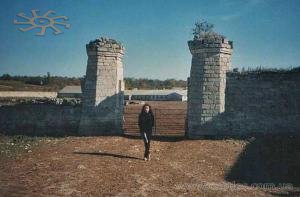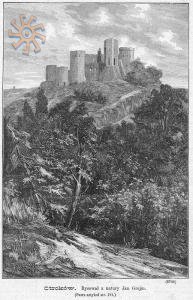 |
 |
|
|
 |
 |
 |
 |
 |
 |
Ignacy Scibor-Marchocki. PRYTULIYA |
 |
 |
 |
 |
 |
 |
|
|
|
The modern look of Myn’kivtsi |
According to Bronislav Gryschuk
Translation from Ukrainian into English by Nadya Dmitriyeva:
The end of the XVIII – beginning of the XIX century was quite a difficult period. Serfdom. Exploitation. And in these typical circumstances of utter suppression, lack of any restraint unexpectedly appears an exception. At first, you do not believe in his true existence, you consider him as a figment of someone’s extremely rich and exaggeratory inclined imagination. Ihnatsiy Scibor-Marchocki is this exception. The only one of its kind, the true exception.
“Going down grate Ushyts’ky road, few miles to Kamianets, in Ushyts’ky district, on a lovely plain spreads Myn’kivtsi - quite big and very beautiful town, exactly the place where the feast of Ceres came about. If to consider the reasonable comments of some travelers over Podillya, stating that its part, located along Dnister stream, without any exaggeration can be called “Podillya Switzerland”, the location of town Myn’kivtsi and its suburbs is in the best place of mentioned “Podillya Switzerland”. (Podol’sk Eparchial Bulletin. 1889 #33).
«Ushyts’ky district had 4 subdistricts. Myn’kivtsi belonged to a second one. The town is situated in a wide and deep valley... That estate was purchased by... Voitsekh Marchocki, and after his death in 1788 Myn’kivtsi together with the suburbs passed into the ownership of his nephew, Ihnatsiy Scibor-Marchocki, an odd person, famous in the first quarter of 19 century. Ihnatsiy Marchocki… proclaimed his estates an independent state and installed on its borders pillars with the name plates, identifying that this is “The border of Myn’kivsk state”... He was a benefactor for his peasants; he liberated them from serfdom and was concerned about their household improvement. For his eccentricity, especially for introduction of pagan feasts, Marchocki was convicted and even imprisoned.
(Proceedings of Podol’sk Eparchial Historical and Statistic Committee, Kamianets’-Podol’skyy, 1900. Red. 9) 
Former palace gates, now – gates of cowhouse |
Marchocki believed that famous in the past Scibor, owners of great estates, were their progenitors. Mikhal Scibor, father of Ihnatsiy, died when his son was a kid. Mother of Ihnatsiy died straight after her husband. As Mikhal had a childless brother – Voitsekh Marchocki, the boy, Ihnatsiy, was transferred to uncle’s care. Certainly, he was considered to be the heir of all Voitsekh’s property – 9000 dessiatin of chernozem (black soil), vast forest tracts, hayfields and parks. The old Marchocki did all his best to provide for boy’s education. However, everything went wrong.
Both, uncle and his nephew, the most stubborn people in the world, appeared to be psychologically incompatible – from the very beginning they started to hate each other, they as if boasted of their obstinacy and arrogance. It came to an incredible thing: Voitsekh sent his nephew to serve in army in order to be killed or to come back to Myn’kivtsi, after few years of Prussian drill, as an obedient person. Later on Ihnatsiy wrote: ”Upon reaching legal age, I kindly accepted the proposal of my uncle and became a soldier: not voluntary, not at my own will; but at a desire of that uncle did I go to the foreign land… and there, in misery and poverty did I spend few years of my real slavery.” (Though, in 1770 Podillya was a part of Polish Kingdom and military teams recruited soldiers to Prussian army on its borders). Ihnatsiy Marchocki came back from the army with a steel character and firm will. During 4 years he managed not only to harden his body, but also to reach good level of German and French languages, classical literature and mythology, Roman law and works of Encyclopedists. The old Voitsekh understood that the results were absolutely adverse to what he expected. Also nephew was certain that uncle’s illnesses didn’t break his obstinacy and arrogance. That is why living under the same roof was quite unreasonable. Someone had to concede.
And Ihnatsiy conceded, for the present. He went to Warsaw, enlisted himself in one of the regiments, became the Major – cherished and respected person in the court. At his petition Voitsekh was even decorated with the order of St. Stanislaw. Impressed and touched uncle called his nephew back to Myn’kivtsi, but Ihnatsiy, disregarding future career, came back to Podillia with a young wife – Eva Ruffo, “Roman patrician” (her husband was one of those who called her in this way). Uncle was painfully affected by this marriage – and once again the hatred seethed in Voitsekh’s heart. However, realizing his weakness, an old one had to make his own will. Even here a sharp enmity to the heir was present: “Though my nephew, Ihnatsiy Marchocki, was always irreverent to me and had an obscene character, and for all this entire he should have been disinherited, I am still devising him all my wealth...” Ihnatsiy was not perfectly satisfied with the eccentric style of the will and he brought a protest into the same court, demanding to change the document’s form and complaining about unbearable persecutions towards an innocent heir. Only lying on his deathbed did uncle find out about the demarche of his nephew. He urgently commanded to compose a contra protest and to disinherit his nephew, but he was late – he died prematurely.
Myn’kovets’ky Klyuch (historical local name) passed into the ownership of new landlord.
Soon, the actions of ex-Major proved that the deceased Voitsekh was not right when compromised the Jacobinic way of thinking of his heir. Ihnatsiy was not devoid of pride for his family. When Podillya became a part of Russia (in 1793), border pillars were installed around Marchocki’s possession. A hazardous joke? Hah… this joke lasted for almost 30 years! 
Castle in Otrokov. |
Why did authorities shut their eyes to “myn’kovets’ky state”? During the reign of Aleksandr I, whose close friend was Czartoryski, the person that dreamed about Polish Kingdom revival under Russian scepter, nobility in Poland was left in peace. The government aimed at proving that Polish people leave much better under protection of Russian state.
Marchocki liberated peasants from serfdom, granted them a self-government, established jury (court with jury), built churches and monuments, opened his own printing house, where different decrees, directions, resolutions and even sermons, later delivered by him in Orthodox and Roman Catholic churches, were published. Marchocki was obsessed with a construction mania: he had been building temples devoted to: Peace goddess, Telemak, Wilhelm Tell, even to Jean-Jacques Rousseau. The last temple had an inscription:”Joani Jacobo Rousseau sacrum esto”.
State government institutions were placed in the building that imitated Acropolis and rose on the top of the hill named Belmont (up to now citizens of Myn’kivtsi call it “bel’man”). A big-sized arch, crowned with a big stone stature of Justice, decorated the courtyard entrance. During the meetings of Myn’kivtsi council Marchocki personally was present – especially for him there was assembled a throne, upholstered with red cloth (the number of those thrones in possession of sovereign, both mobile and stationary, can be hardly identified).
Ihnatsiy had built 4 castles for his family and himself – one for each season. The most luxurious one was castle in Otrokov estate, in the middle of a marvelous park, embellished with different caves, columns, statures (now this is the place where “luxurious” pigs are being fattened). A pagan temple – Hermitage – was constructed here; there Ihnatsiy had been accepting management reports and reports of the committee heads, and had been approving sentences announced. All passers-by used to stop near one branchy dry oak: Marchocki had hung a scull on its trunk and inscribed: “I also used to be young and pretty…” 
Scibor-Marchocki always liked to compose different texts – sermons, epitaphs, romances, to epigrammatize about neighbors and Kamianet’k clerks; he also liked to build memorials on the graves of his “ministers” and “lieges”. Here is one of such inscriptions – on a gardener’s tomb: "He came from framers and was named Hortenziy. He worked as a gardener and doing this, he greatly contributed to decoration of Prytulia. He was very gifted and intelligent. Lived almost 50 years and died on 17th of March 1825."
Sovereign of Myn’kivtsi fenced the town cemetery by a high stone wall; embossed it with bas-reliefs and mythological symbols; he also established a special funeral brotherhood and invented an original funeral ceremonial that remotely resembled Christian. Regardless of the cleric that performed a ceremony, Ihnatsiy himself took very active part in the activity. Wearing his long toga, carrying staff in his hand he was leading the procession. Usually, when they were approaching to the cemetery, the gateway was closed. Sovereign knocked three times on the gates and started a conventional dialogue of symbolical questions and answers between him and members of brotherhood. Finally, members of brotherhood announced, that they accept the deceased to their abode – and gateway started to open.
His passion for mythology didn’t prevent him from building and decorating Christian churches. However, no one could persuade him, that he had no right to sermon in the churches. And yet he continued to sermon without any restraints. He printed the best of his sermons. By the way, “Hamlet” in Polish was first printed in Myn’kivtsi. Ihnatsiy had built a school there (also he dreamed about establishing a university), he opened a pharmacy and invited 2 doctors – de Hering - an allopath and Stephany - a homeopath. They were very popular, and Myn’kivtsi became a kind of health resort; all this stimulated to build a decent hotel.
When a plague started in 1797 in this region, Marchocki provided for medicine and invited sufficient number of doctors; also he published a brochure, describing measures that should be taken to overcome the disease. Families of the deceased from plague were saved by Ihnatsiy when he established the asylum where they could have food, cloth and be taught different professions.
Each year Marchocki was getting richer and richer. Myn’kivtsi turned into a prosperous town with 4000 of citizens, with cloth and carriage factories, factory of anis apple oil production, with brickyard, varnish and paint plants, with mulberry trees gardens. Its own paper was manufactured there and lime – calcined. Marchocki took care to prevent from cheating in measuring and in weighing in shops. For this purpose he ordered to build a special building with a tower, where accurate scales were installed.

However the most important action - peasants’ liberation from serfdom was performed on 1 of January 1795, when on a universal meeting there was signed a declaration, beginning with the following words: "We, residents of hereditary possessions: Myslyborzh, Horodysche, Katerynivka, Antonivka, Kruzhkivtsi, Otrokiv, Khananivka, Prytulia, Staryk, Tymkiv, Pobuyna, Pobuyanka, Syvorohy, that form up Myn’kivtsi state, located in Ushyts’ky sub-district of Podillya district, gathered together to develop and establish definite laws…came to the conclusion that…the highest value…is freedom…” This declaration was duplicated in printing house and sent to the neighboring estates. However, the neighboring landlords took care to destroy that document and forget about it.
The strict division of power to legislative, executive and judicial was introduced in Myn’kivtsi state. Ihnatsiy was the head of this state, or the elder or patriarch, as he ordered to call him. Considering himself as a father of Myn’kivtsi state “nations”, he also was a head of everyone who “by his occupation and work benefited” the state. Two doctors, an architect, a lawyer, a land manager, medical assistants, obstetricians and a secretary were among those, who didn’t participate in state governing. Each village had its own collegiate court that tried different cases as the first instance. Court of the second instance was established on Belmont. Ihnatsiy had passed a law that forbade calling peasants serfs, louts or boors.

Exile to so-called Pontiy possessions (lands in Kherson district, where several settlements were built by count Marchocki) was the severest punishment. Money penalty and birching were considered as less severe punishments, however Ihnatsiy himself ordered not to apply birching very frequently, but to replace this punishment with work at the factory.
When Ihnatsiy found out that his daughter was in love with a not highborn fellow, he imprisoned the latter and on a meeting, called exactly on this occasion, delivered a very strict speech. He took the following decision: since a guilty person dared to raise his eyes to a maiden of a powerful Marchocki family and in her person he offended every girl of Myn’kivtsi, each of them should take a twig, come into the jail, spit upon him and birching turn out from Myn’kivtsi possessions.
People revered the count; no one was surprised either with his Roman toga or with the staff in his hand. As for the pagan feasts (thus, the feast of Ceres was linked with The Feast of Mother of God), ordinary people even liked them. A disaster happened in 1811, when the bishop Matskevich arrived from Kamianets to Myn’kivtsi state to revise his eparchy. Taking this opportunity, the count invited the bishop to his estate to carry out solemnization of his daughter’s marriage. The bishop went to Myn’kivtsi. On the border of his possessions, surrounded by the crowd of his “lieges”, Marchocki personally met him. Of course, wearing his toga. And of course with the staff in his hand. He delivered a grandiloquent invitation speech and offered “the high priest” to change the carriage to triumphal car – a platform with a throne on it. That car was hauled by 4 black oxen with horns plated with gold. State clerks carried a baldachin over the throne; girls, dressed as Cupids, covered the road with flowers. 
At first the bishop was very much surprised and confused, but when he saw that everyone reacted to that masquerade with rapturousness, he triumphally entered Myn’kivtsi.
The next day the bishop performed the marriage ceremony, however not in the church, but in an original theatre, built in the middle of a field. Marchocki met the guest with a very long and pathetical greeting, ending with:”High priest, leave your throne, come to the altar of God and lay the blessing on this young couple.”
At first, the bishop indulgently reacted to all eccentric actions of the count, but later their relations aggravated. The wife of Ihnatsiy died, and in his old age, the count passionately fall in love with a daughter of a nobleman – a person, that almost all time was spending in Myn’kivtsi estate. However, the eldest son of the count also liked the same girl - and they even got married secretly in the local church. And once again the old count had shown his stubborn nature. How did they dare to get married? Without his knowledge?? In his church??? But only Ihnatsiy was the first and the only benefactor of local clergy, owner of all church utensils that were given to the priest only before the ceremony. Seriously offended by the priest, Ihnatsiy took all his staff from the church. The priest sent a complaint to the bishop. The latter sent the message to the count, indignantly asking to clarify the reason of Ihnatsiy’s interference into the church activities; the bishop also reminded him about the Ceres feast and his illegal sermons. He suggested once and for ever to stop pagan ceremonies, unacceptable by Christians.
The count sent a reply, where he, by referring to the grate philosophers of XVIII century, proved that each true Christian can sermon in the churches of Podillia district, and he, Marchocki, even obliged to do this, since the local clergy was poorly educated. As for the Ceres feast, the count tried to prove, that that was no more than a common to all Christians harvest feast. The flat and sharp reply offended the bishop. He complained to the governor and obtained the order, by means of which the local police officer was entrusted to engage the count by a written document not to sermon and celebrate the Ceres feast. It is not difficult to guess, that the count even didn’t think about submitting: as soon as the harvest time had ended, he organized the feast with all solemnities and ceremonies. And even though the local Roman Catholic priest refused from participation in pagan rites that changed nothing: two Capuchins were invited from Dunayevtsi, and the feast came about with an influx of people. 
|
|

|

|
 |
|
"Замки і храми України" - некомерційний cайт, що підтримується фактично силами і ентузіазмом однієї людини. Допомогти проекту:
гривневий рахунок 4149 5100 9101 3567
євровий - 5168757402858452
Patreon
Ваш внесок допоможе не зневіритися в тому, що роблю вже 20 років. Дякую.
Екскурсійний супровід у мандрівці Кам'янцем-Подільським, Поділлям та Західною Україною в цілому: kamienczanka@gmail.com 
© All rights reserved.
Всі права на матеріали охороняються у відповідності до законодавства України.
Будь-яке використання матеріалів сайту можливе лише за попередньою узгодженністю |
Розробник 
|
|
|

